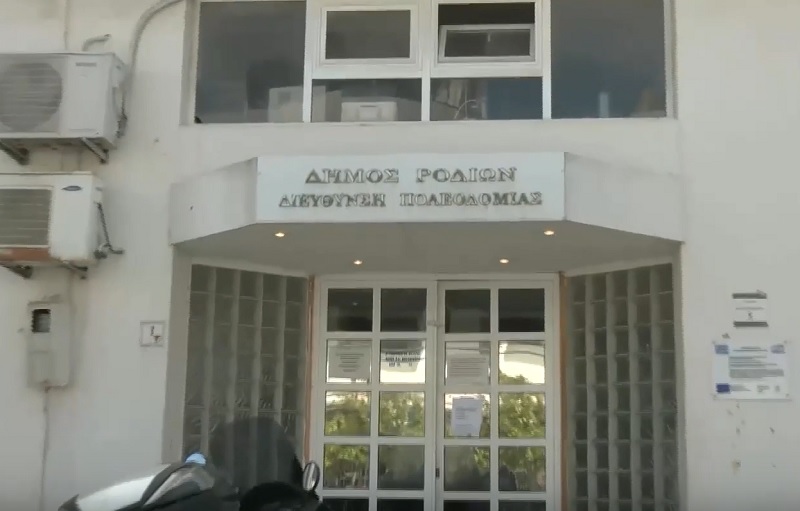Stakeholders allegedly interfered on the digital platform by falsifying real estate
Faced with a complex hypothesis extending from arbitrary construction to communal zones, to the direct alteration of data in the E-Licenses of the Technical Chamber of Greece (TEE) is justice in Rhodes, after the revelation of the circuit in the island.
The case spreads to many levels, from urban arbitrariness and false statements to legalization to systematic intervention in the official TEE information system. They are alleged to be involved in civil engineers, building services and businessmen, constituting an organized network, with the ultimate goal of economic benefit to the detriment of legality and the State. The subject of the circuit, among other things, was the illegal submission of arbitrary buildings to the law on settlement and the deliberate use of TEE digital tools for lesions and forgery.
Illegal subordinate, protocol transfer and intervention in a state system
The new dimension of the case, as the newspaper reveals “Democratic“, It concerns the illegal modification of existing building folders in e-poems, with operators the civil engineers themselves. According to the revelations, they transferred protocols from one law to another, changed the original beneficiaries and submitted false statements for constructions, which did not even meet the basic conditions of affiliation.
The database control is expected to reveal the range of interventions, as authentic documents remain in the system, as well as traces of each change.
In particular, the intervention in the e-Licenses was made by the operators themselves civil engineers, who were in possession, their personal passwords, and the responsibility for the decisions of the law on arbitrators.
Indications for such practices already exist in the telephone conversations between the defendants and the customers, which will be evaluated in the second phase of the interrogation.
The ‘set up’ of the statement
In one of the most typical talks recorded by the “girl” of the ELAS’s indifferent, the allegedly involved are openly discussing how to set up the arbitrary statement in a case allegedly involved. One interlocutor proposes to use Law 4178 with a statement that looks “old”, while other laws are examined, such as 3843, 720/1977 and 1337/1983.
Indicative is the story:
• “Why can’t you do it with 4495 or 4178? You make a statement over there it was obvious that it had been declared long before and it was simply a repair that did not want a license, “says one
• “Yes, I have something old there that sent it,” the other replies.
They continue to discuss, examining how the scenario would be made, so that the construction appears to have been legal, but suffered “fire damage” and a simple repair was done. This debate, which closes with a regulated Zoi Zoi meeting for further further, shows the pre -determined effort to counterfeit real data through the abusive use of laws that had been voted on for a completely different purpose.
Town Planning Chaos with Organized Crime Dimensions
The scandal has multiple aspects and political extensions. From the deterioration of public data, abuse of power and financial damage to the State, to the inability to demolish buildings that enjoy the “legality” of a false affiliation.
Digital folders and protocol transfer
The complained method includes transfer of building protocols from older laws to younger, while changing the original beneficiary, without his / her consent or knowledge. These interventions, allegedly performed by forgery, can be determined by checking the database, in which all interventions and uploaded documents remain recorded.
The competent judicial authorities with the report must order the relevant expertise by assigning the internal affairs or the prosecution of cybercrime and the inspectors of the Ministry of Infrastructure through the National Transparency Authority. The check will concern:
• Which persons were the initial beneficiaries of the subordinate
• Who paid the fees and doses (even third parties)
• the frequency and the amount of payments in order to reveal suspicious gaps
• Who finally ended up in the protocols and building rights
Illegal subordination to the communal
Special emphasis is placed in cases where the subcontinent was completely illegally arbitrarily, within the communal (seashore and/or beach). The talks of stakeholders include reports of arbitrary statements made after 2011, that is, outside the settlement context, in accordance with applicable laws.
Authorities must at the same time assign the comparison of aerial photographs in order to substantiate the untruth of statements. Shops in Faliraki, Dry, Ialyssos and South Rhodes are alleged to have benefited from such practices.
The institutional framework and the legal consequences
According to the Opinion 232/2017 of the State Legal Council, arbitrary constructions within a commander (seashore/or beach) are not subject to Law 4178/2013, nor the next 2017, except for very limited exceptions, while the arrangements for constructions after 28/07/2011 are not permitted.
When an illegal affiliation is found, then the law is submitted to the competent YDO, an appeal to the relevant SYPTA or a court application for annulment. Since the settlement is not canceled, despite illegality, it remains active because of the presumption of the legality offered by digital approval.
This makes internal interventions in the e-pointing system particularly critical, since if they are not detected, they can legalize illegal real estate in perpetuity.
In fact, it is noted that the system does not control any control and the responsibility of the subject is borne by the civil engineer.
The case of the circuit in Rhodes is not only criminal, but also state and institutional, if the intervention in e-poems is confirmed by digital evidence, it will be abuse of state digital infrastructure for the benefit of private individuals. The “bet” for the authorities is not only the dislocation of the circuit, but the institutional shield of urban planning and the TEE, by redesigning control systems, stricter safety valves and reinforcement of control by independent authorities.







